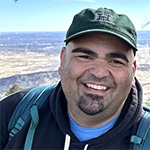Jeff Rickard is one of the truly familiar faces of the BSM Summit. He’s not involved in the planning or with the company, but it’s an event he never misses.
“It went from a small group in Chicago the first year to recognition from everyone in our industry, and there’s a lot to be gained when we all get together from different markets and cities,” said Rickard of the event’s growth. “We’re not competing against each other. Instead, we’re there to bring each other ideas, lift each other up, and give each other not just support necessarily, but different ways of looking at and doing things. It allows you to kind of take some energy from another building and bring it back to your own.”
Since the BSM Summit first launched as an invite-only event, Rickard has held jobs in Indianapolis, Boston and Charlotte. In fact, it was at the 2022 Summit in New York where he had his first meeting that would lead to him taking the reins at WFNZ.
Different jobs have come with different situations. Rickard has been able to talk with fellow attendees about translators, transitions to FM, and building digital strategies. He appreciates the networking opportunities that exist at the Summit, but the access to new points of view have helped him grow as a programmer.
“Over the past five or six years, the industry has been growing up a lot,” he says. “In the last, I don’t know, three to four years, I think BSM has helped that along the way.”
The “radio is dying” narrative is a popular one. We can pretend that it only exists outside of our industry, but how many of us know someone very much inside the industry that exclusively speaks the language of doom and gloom when asked about future goals and plans?
Rickard says that coming to the Summit is a necessity for anyone stuck in or around that mindset. Radio may not be as popular as ubiquitous as it used to be, but there is still enthusiasm for sports radio. That is something to feed off of!
“Local sports radio, if done right, will always attract an audience, because [listeners] can go to Sirius XM and they can go to ESPN and they can get the main stories of the day, and they can talk about the Chiefs winning another Super Bowl, and they can talk about if the Golden State Warriors being past their prime,” he says. “That’s all great, but if you’re in Indianapolis or Charlotte and you want to hear about respectively the Pacers or the Hornets, you know that we’re going to be talking about them. I think we’ve learned about the things that our local audience is going to want.”
Lessons Rickard has learned at past BSM Summits have had a major impact in Charlotte. WFNZ’s cume isn’t just up since he arrived. It has nearly quadrupled.
According to Rickard, that is the result of valuing all perspectives. He’s a programmer, but that doesn’t mean he is only paying attention to sessions featuring other programmers. He also isn’t focused only on executives that could offer him the next opportunity. Rickard encourages any programmer that attends the BSM Summit to come and take notes when talent from other markets are on stage.
“You have to realize that they’re not on a level below you. They are in large part you’re partners,” he says. “I always enjoy listening to guys that are highly successful, at those summits, talk about what motivates them, what they’re thinking about, how they go ahead and put a show together. There’s a reason we hire those talented people because they’re really good at what they do. They’re really good at attracting an audience, and they’re better at holding that audience. That’s why they’re speaking at a conference like BSM.”
Day-to-day operations are always on the minds of the people that attend the BSM Summit. When Jeff Rickard comes to New York next month though, he wants to hear conversations about the bigger picture. Whether it is from the stage or at networking events, he wants to be part of the conversations that are fundamental to the future of radio as a medium and broadcasting as a business. The one at the forefront of his mind? Audience measurement.
“We’ve been dealing with Nielsen for a long time,” he says. “There’s good, there’s bad. We all understand the system and how it works. But with so many of our listeners coming to us now through an app or coming to us by downloading what we’re doing online, they’re coming to us straight to the website. We’re starting to be able to kind of pick and choose our own numbers. We can see with certain day parts and certain guests or certain topics that, ‘wow, a lot of people checked into the app at that particular time.’
“So I think moving forward, the biggest thing for our industry is how do we continue to more accurately assess who our audience is and what’s really happening there on a moment to moment basis. I think we’re getting better every year, but I’m curious to see what the industry believes is the future for the next ten years, because I don’t think we’re using it now.”

Demetri Ravanos is a columnist and features writer for Barrett Media. He is also the creator of The Sports Podcast Festival, and a previous host on the Chewing Clock and Media Noise podcasts. He occasionally fills in on stations across the Carolinas in addition to hosting Panthers and College Football podcasts. His radio resume includes stops at WAVH and WZEW in Mobile, AL, WBPT in Birmingham, AL and WBBB, WPTK and WDNC in Raleigh, NC.
You can find him on Twitter @DemetriRavanos or reach him by email at DemetriTheGreek@gmail.com.




